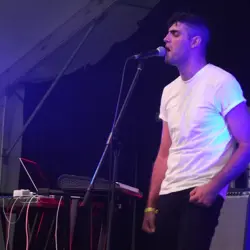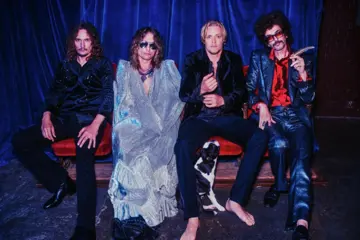 Daughn Gibson
Daughn GibsonOn his debut album, Daughn Gibson painted a fascinating world soundtracked by Americana, electronica and gothic balladry. The artwork for that album was subdued black and white and fittingly, in line with the music within, the cover of Me Moan is a darker-themed explosion of pink and purple sexual and religious imagery.
Gibson has taken the basic musical premise of his debut, All Hell, and expanded it into darker corners with more elaborate composition and instrumentation. He also takes more risks. The most unsettling of these is the way he plays with his vocals, both his phrasing and the effects that at times bury his voice under layers of pitch changes and reverb. On the glitch-laden kraut-goth The Right Signs, the words are consumed by the treatments he adds to them, making it sound like Depeche Mode on half speed - a strange idea that works surprisingly well. Elsewhere he plays it straight on the excellent You Don't Fade and instead uses other voices to build a patchwork choir that sounds half human, half synth. Aside from his voice, there is also a wealth of ideas across the record. The Pisgee Nest, in particular, possesses a catchy, moaning guitar line that conveys emotion as strongly as Gibson's words.
The general mood of Me Moan places Gibson in the same realm as Jack Ladder, Kirin J Callinan and John Maus. It is partly due to their baritone voices but also their inventive, experimental approach to the cross-pollination of musical styles and a willingness to subvert and challenge the comfort level of the listener without sacrificing the essence of a great song. In the end it is still memorable melodies and rhythms that shine through on this endlessly fascinating album.















